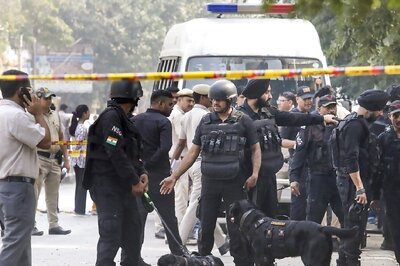
views
PRISTINA, Kosovo: The leader of a junior party in North Macedonias governing coalition was questioned Wednesday by prosecutors from a special international court who are investigating possible war crimes committed during and after the war that led to Kosovos independence from Serbia.
Ali Ahmeti, 61, of the ethnic Albanian Democratic Union for Integration party, appeared for questioning at the offices of the European Unions rule of law mission in Kosovo’s capital. In July, Ahmeti said he was invited as a witness.
The Kosovo Specialist Chambers and Specialist Prosecutors Office have international judges and lawyers charged with looking into allegations that former members of the Kosovo Liberation Army, an ethnic Albanian separatist group, committed war crimes and crimes against humanity during and after the 1998-1999 war.
After questioning hundreds of ethnic Albanians, prosecutors charged Kosovar President Hashim Thaci, former parliament speaker Kadri Veseli and others with crimes against humanity and war crimes, including murder, enforced disappearances, persecution and torture. A pretrial judge has not yet decided whether to proceed with the case.
The court did not issue a statement explaining why Ahmeti, whose party holds seven posts in North Macedonias new Cabinet, was interviewed in Pristina and not at The Hague, where the special court is based.
Ahmeti joined the Kosovo Liberation Army as one of its founders, although he is a resident of neighboring North Macedonia.
Kosovos Parliament declared independence from Serbia in 2008, nine years after NATO conducted a 78-day airstrike campaign against Serbia to stop a bloody crackdown against ethnic Albanians in Kosovo. Most Western nations recognized Kosovos independence, but not Serbia.
Relations between the two countries remain tense.
Disclaimer: This post has been auto-published from an agency feed without any modifications to the text and has not been reviewed by an editor

















Comments
0 comment